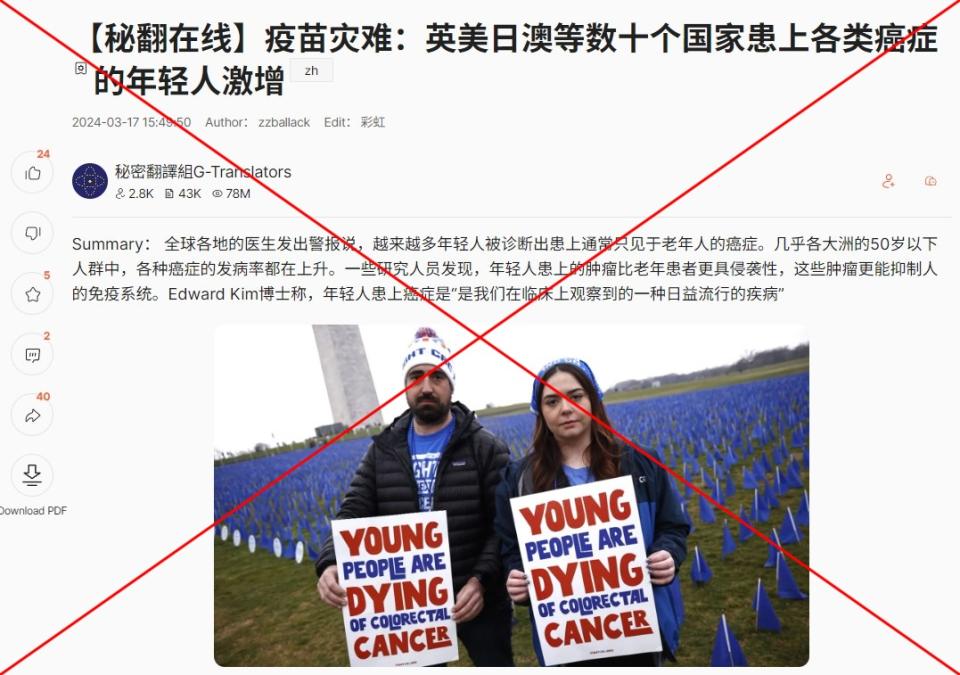Covid vaccines falsely linked to study on rising cancer cases
A Chinese scientist who co-wrote a study on cancer has rubbished social media posts that falsely linked the research to Covid-19 vaccines. The paper, published in a leading medical journal, found cancer cases increased in under-50s in the three decades before the pandemic and subsequent roll-out of Covid jabs, meaning the shots could not be to blame for the phenomenon. The World Health Organization's cancer agency said there was no evidence that any vaccines caused cancer.
"Vaccine disaster," read the headline of a simplified Chinese article published by GNews on March 17, 2024.
"Surge in all types of cancer diagnoses in young people from dozens of countries, including the UK, US, Japan and Australia."
GNews is affiliated with a media operation owned by exiled Chinese tycoon Miles Guo that often pushes misinformation about the pandemic.
The article appears to be a translation of a Daily Mail report on a surge in cancer diagnoses in young people.
However, the Daily Mail's report does not mention the phrase "vaccine disaster" -- which is often used in Covid-19 vaccine disinformation.

Similar posts racked up hundreds of shares on platforms including Facebook, X and Gettr.
Misrepresented data
The Daily Mail's article reports on a study which found cancer cases in 14 to 49-year-olds increased by 79 percent between 1990 and 2019 (archived link).
The research, based on data from more than 200 countries, was published online in the BMJ Oncology medical journal on March 5, 2024.
"Full understanding of the reasons driving the observed trends remains elusive, although lifestyle factors are likely contributing," the researchers said in an editorial linked to the study.
In the study, they pointed to poor diet, smoking and alcohol as major risk factors underlying cancer in the age group.
Neither the study nor the Daily Mail's article mention vaccines.
Jianhui Zhao from Zhejiang University School of Medicine in China, who co-authored the study, pointed out that the research used pre-pandemic data.
"Our study's data does not extend beyond 2019 and thus cannot be used to make any assertions about the COVID-19 vaccine's impact on early-onset cancer," he told AFP on March 28, 2024.
The WHO declared Covid-19 a public health emergency of international concern in January 2020. The first Covid-19 vaccines were given emergency use approval later that year (archived links here and here).
'No evidence'
The WHO's International Agency for Research on Cancer (IARC) said there was "no evidence that any vaccines cause cancer".
"Increasing trends in cancer in young persons were already observable before the Covid epidemic and associated vaccination campaigns," an IARC spokesperson told AFP on March 25, 2024.
Cancer patients are recommended to get vaccinated against Covid-19 as they have a higher risk of complications if they are infected, they said.
They pointed out that vaccines such as the hepatitis B (HBV) and human papillomavirus (HPV) vaccines reduce the risk of cancer.
Meanwhile, the American Cancer Society reported in January 2024 that young adults were the only age group showing an increase in cancer rates between 1995 and 2020 in the United States (archived link).
Misinformation about Covid-19 vaccines has flooded social media -- including false claims that research has found they cause cancer -- despite the World Health Organization stressing that the benefits of vaccination outweigh the risks (archived link).
April 17, 2024 This story was updated to amend internal metadata

